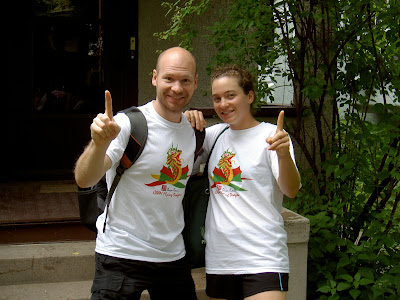
Besides the get together of the families of about ten of Richard's grandchildren, there was a viewing of a granite bench to commemorate the 50 plus years that the Anderson family farmed and lived on this land. It's a nice bench placed in a nice location near the visitor center and inscribed with the names of the Andersons who lived here. They are all now gone from the earth, but not forgotten. All their names were spelled correctly on the inscription. GZ and I posed behind the bench which is in an area that once grew corn and soybeans not far from the Yellow River.


The group of cousins gathered for a photo, too. Besides the cousins, Terje Nordberg posed in stead of his wife, Nancy. Terje brought his book to the reunion and we were able to obtain autographed copies. The book chronicles the immigration of Nils Olai Anderson and his family to Wisconsin from far northern Sjovegan in Norway. His daughter, Hansine, married Richard Anderson in 1913 and lived here until her death in 1957. Also pictured is John McCune, our uncle who farmed the land for many years and now is the last member of that generation. He remembers a lot about the land and how it was farmed with the two horses, Babe and Toots. Babe was the white one. Toots was the one with an attitude.

Also displayed at the museum was this piece of history describing the family that lived on the farm for those 50 plus years. The photo includes several of the attendee cousins at today's celebration. It's a nice addition to the visitor center.


Also displayed at the museum was this piece of history describing the family that lived on the farm for those 50 plus years. The photo includes several of the attendee cousins at today's celebration. It's a nice addition to the visitor center.

It is interesting to note that the family farm was used for about 60 years, until 1969 when it was sold to the state of Wisconsin, while the Fort, which has been rebuilt as part of the park, stood for a single winter in 1803 before being burned down when the traders deserted it. It shows that recent history is much less interesting than history long forgotten and nearly lost. Of course, it should be noted also that the Native Americans lived on and used this land for hundreds of years before the fur traders came with beads to trade.
















